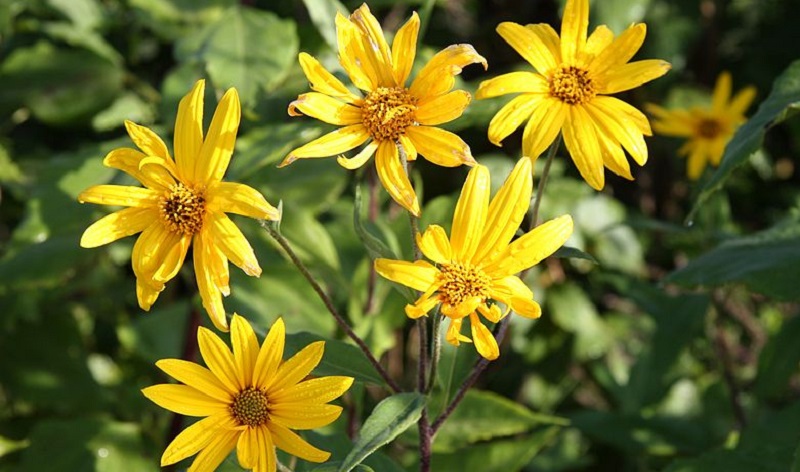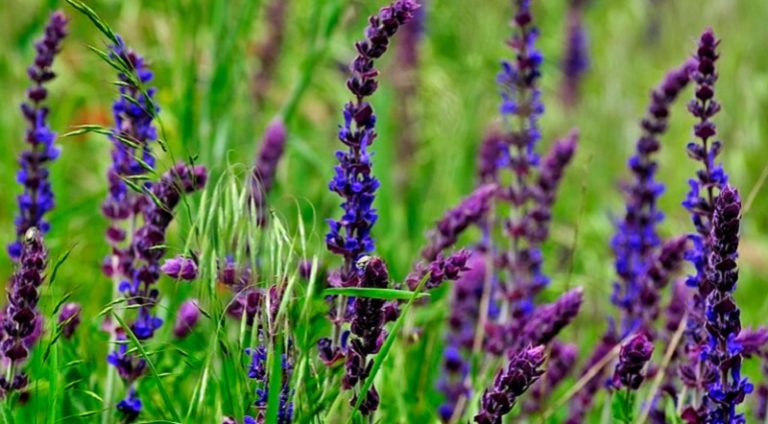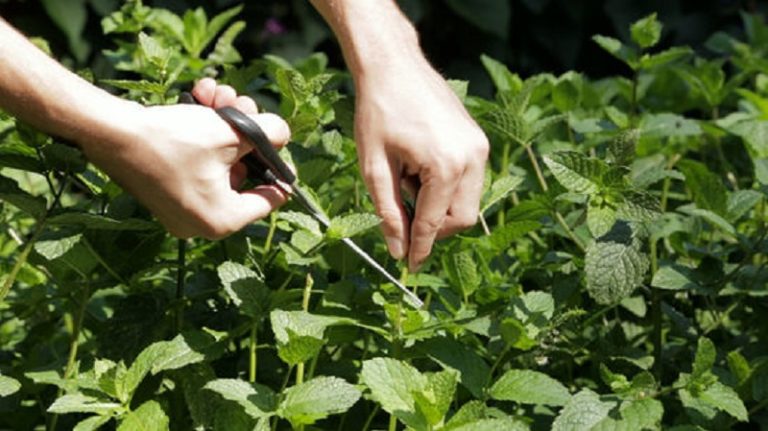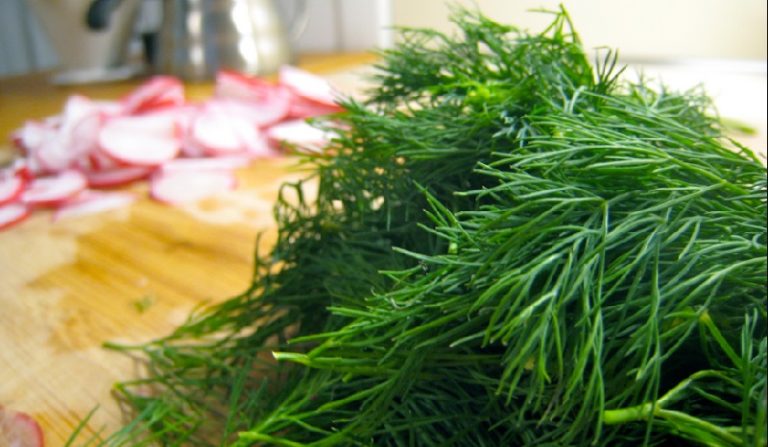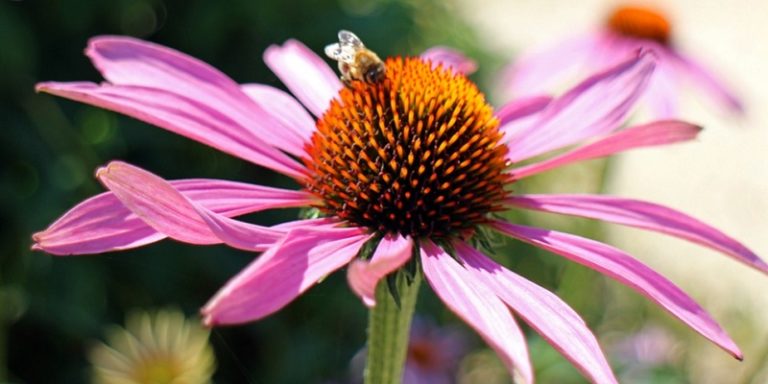Medicinal plants: Jerusalem artichoke
Jerusalem artichoke is a plant that looks like a sunflower, and hides its tubers underground, which are a tasty and healthy addition to your daily diet!
Jerusalem artichoke (earthen pear) is a perennial herbaceous plant about one and a half meters high (sometimes up to four) with a straight pubescent stem, ovoid leaves and yellow basket inflorescences with a diameter of 6-10 cm. There are 1-3 stems in the nest, up to 30 tubers on short stolons, compactly collected. Roots at a depth of 10-15 cm extend horizontally to 4-4.5 m in loose soil, and vertically to 1.3 m, which allows plants to withstand drought. It can grow in one place for up to 30 years. Tubers weigh from 20 – 30 to 100 grams, different colors (depending on the variety) – white, yellow, pink, purple, red; The pulp is tender, juicy, with a pleasant sweetish taste. The plant is also known as “earthen pear” and “Jerusalem artichoke”. In the wild, the plant is found in North America. The tubers are edible. It is grown as a valuable fodder, technical and food plant.
Jerusalem artichoke looks like a sunflower, so another name for it is tuberous sunflower. It reaches a height of two meters or even more, has a straight stem, yellow flowers, leaves that look like a sunflower. At the ends of the underground shoots of this plant there are tubers of different shapes, colors and sizes, resembling potatoes. The plant is mainly propagated by tubers rather than seeds. The earthen pear begins to bloom only in late autumn, ripens in October-November, when frosts appear.
. . . . . .
Among the features of Jerusalem artichoke are:
- It does not require care at all, grows on its own on any soil.
- He is not afraid of any pests and weeds.
- It feels good both in the sun and in the shade.
- It does not accumulate nitrates either in the green mass or in the tubers.
- It tastes like asparagus and cauliflower, and potatoes in calories.
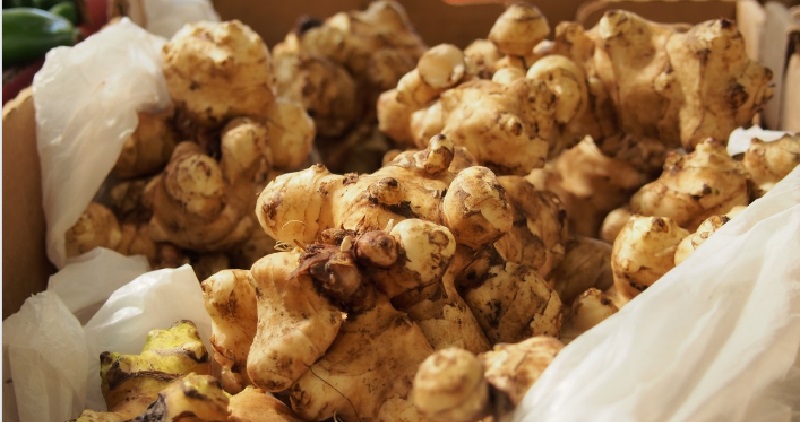
Jerusalem artichoke – useful properties
The composition of Jerusalem artichoke includes: pectins, sugars, mineral salts (silicon, potassium, iron and zinc), proteins, amino acids and, of course, many vitamins. Jerusalem artichoke contains inulin, a substance that is so necessary for those who suffer from diabetes. There is evidence that regular consumption of Jerusalem artichoke for a long period of time lowers blood sugar levels. These properties make it extremely necessary for both those who already have diabetes mellitus and those who are prone to this disease and are at risk of getting sick. For this purpose, it is recommended to take 2-3 tubers three times a day, preferably ten minutes before meals. The inulin contained in Jerusalem artichoke helps to remove many toxic substances from the body. With food and during digestion, many ballast substances enter the intestines, which inulin binds and eliminates.
- Inulin promotes more active activity of the gastrointestinal tract and stimulates choleretic activity.
- The consumption of Jerusalem artichoke contributes to the fact that the body becomes more resistant to all kinds of infections and viruses that affect the digestive organs. Its beneficial substances prevent the penetration of all kinds of pathogenic bacteria and parasites into the body, such as giardia and opisthorchis, for example. In addition, Jerusalem artichoke promotes the formation of normal microflora in the intestines, creating all the necessary conditions for this. It is thanks to this that it is indispensable for those who suffer from dysbiosis.
- Jerusalem artichoke is good for mucous membranes, as it stimulates their blood supply.
- It is used as an aid in the treatment of stomach ulcers, duodenal diseases, duodenitis, colitis, gastritis, enteritis, pancreatitis, heartburn, diarrhea and constipation.
- Jerusalem artichoke stops vomiting, relieves nausea, relieves heartburn and bitter taste in the mouth, eliminates pain and bloating. If, when using various medicines, you combine their intake with Jerusalem artichoke, then these ailments can be cured and eliminated at least 5-7 days earlier.
- Jerusalem artichoke helps to absorb selenium faster, despite the fact that it is not part of it. Jerusalem artichoke is recommended for regular use by people living in cities with a poor ecological environment, because it helps to remove salts of heavy metals from the body. Jerusalem artichoke is a cocktail of carbohydrates, organic acids, proteins, vitamins and many other useful substances.
Jerusalem artichoke – contraindications
No matter how useful the product is, there will always be people with individual sensitivity to it . You need to be aware of this so that the use of Jerusalem artichoke does not lead to adverse consequences. It is worth noting that raw Jerusalem artichoke can cause flatulence. Fortunately, this is the only way to exhaust all the contraindications of this plant.
Lavender comes in pink, purple, white, and even yellow.
Jerusalem artichoke in cooking
Jerusalem artichoke tubers taste pleasant, juicy, they will add a certain variety to your menu. Earthen pear can be fried, stewed, boiled, evaporated, dried. The healthiest way to preserve all the nutrients of Jerusalem artichoke is to eat it raw. A good option is to add to a variety of salads. It can also be boiled preliminarily in milk or water, and then cook dishes.

